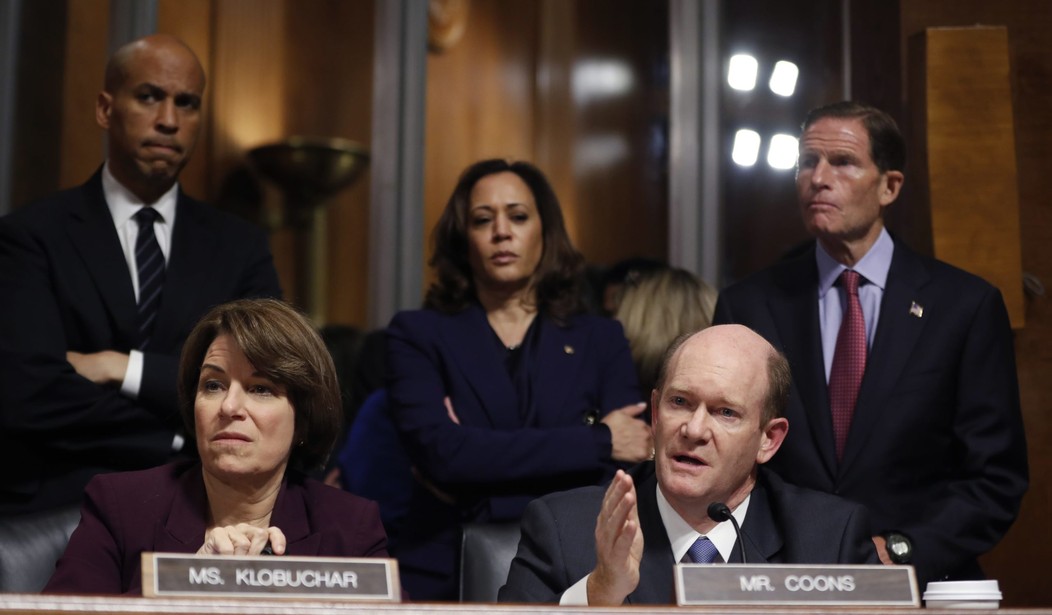In the past two years, Democrat-aligned senators have launched inquisitions into the religious beliefs of President Donald Trump’s nominees for judicial and administration positions. This week, the Family Research Council (FRC) released a report naming twelve offenders and documenting the nine times when senators applied an unconstitutional religious test for public office. Three of these senators are likely candidates for the 2020 Democratic presidential nomination.
“The senators asking these questions are more interested in painting the nominees as partial because of their religious convictions, rather than actually pursuing the truth,” Alexandra McPhee, Esq., FRC’s director of religious freedom advocacy and author of the report, told PJ Media in an interview on Friday.
She argued that the questions senators posed to nominees “show a distrust of religion.” These senators “are probing beliefs of nominees that have nothing to do with whether they are able to carry out their duties faithfully.”
McPhee argued that these kinds of questions support “the idea that someone who has strong convictions is disqualified for office because of their faith.”
That directly contradicts Article 6, Clause 3 of the U.S. Constitution, which forbids a religious test for public office. Sen. Mike Lee (R-Utah) argued that “asking a nominee about the particulars of his or her religious beliefs” is inappropriate because it will “inevitably expose those beliefs as somehow a qualifier or a disqualifier for public office.”
Here is the list of senators, from the first to launch a faith-based inquisition to the most recent.
1. Sen. Bernie Sanders (I-Vt.)
Bernie Sanders, a Democratic presidential candidate in 2016 who seems likely to run again in 2020, began the trend of anti-religious inquisitions in June 2017. Sanders asked Russell Vought, a Trump administration nominee, whether he considered Muslims unable to go to heaven since he believes Jesus Christ is the only path to salvation. Vought had expressed that opinion in an article written in his private capacity.
Sanders asked Vought if the statement of faith of Wheaton College, Vought’s alma mater, was “Islamophobic” and whether non-Christians can go to heaven. The nominee explained that this position on salvation is his belief as a Christian.
“I would simply say, Mr. Chairman, that this nominee is really not someone who is what this country is supposed to be about,” Sanders declared, insisting that he would “vote no.”
2. Sen. Chris Van Hollen (D-Md.)
During the hearing on Russell Vaught, Chris Van Hollen said, “I think it’s irrefutable that these kinds of comments suggest… you are condemning people of all faiths.”
Van Hollen suggested that since Vaught believes only Christians are saved, he cannot be trusted to serve in government. “It’s your comments that suggest a violation of the public trust in what will be a very important position.”
3. Sen. Sheldon Whitehouse (D-R.I.)
Sheldon Whitehouse has applied a religious test many times in the past two years.
In July 2017, Whitehouse asked Judge Trevor McFadden about the statements of belief coming from McFadden’s church, Falls Church Anglican. The senator asked the judicial nominee whether he would uphold the Obergefell v. Hodges (2015) Supreme Court ruling making same-sex marriage legal.
In September 2017, Whitehouse cast aspersions on the impartiality of Judge Amy Coney Barrett because she signed a petition expressing the traditional Roman Catholic views on the sanctity of life, marriage, and sexuality. He also asked Barrett about her speaking engagements with Alliance Defending Freedom (ADF), referencing the unsubstantiated smear that ADF is a “hate group.”
This smear comes from the Southern Poverty Law Center (SPLC), a far-left smear group that faces multiple lawsuits for branding mainstream conservative and Christian groups “hate groups” on par with the Ku Klux Klan. These smears inspired at least one terrorist attack, and have already cost the SPLC millions in damages for defamation.
In October 2018, Whitehouse asked Allison Rushing, another Trump judicial nominee, about her participation in ADF events, again referencing the SPLC’s false label. Whitehouse specifically asked Rushing, “In your view, are Judeo-Christian morality and homosexuality incompatible?”
In January 2019, Whitehouse asked (now) Attorney General William Barr about a 1992 speech in which Barr allegedly “blamed secularism for virtually every contemporary societal problem.” The senator asked, “Given your stated views on the evils of secularism, what commitments will you make to ensure that non-religious career attorneys and staff at the Department [of Justice] are protected against disparate treatment on the basis of their secularism?”
4. Sen. Dick Durbin (D-Ill.)
In September 2017, Dick Durbin questioned Judge Barrett over an article from law school about Catholic judges and specifically pressed her on what kinds of cases a Catholic judge should recuse herself from.
5. Sen. Al Franken (D-Minn.)
Al Franken, who has since resigned, slammed Judge Barrett for speaking at an ADF event. He went so far as to compare ADF to the Cambodian dictator Pol Pot, thanks to the SPLC “hate group” designation.
6. Sen. Dianne Feinstein (D-Calif.)
Dianne Feinstein infamously told Judge Amy Coney Barrett, “The dogma lives loudly within you.” She also referenced the SPLC and attacked Barrett for speaking at an ADF event.
“Whatever a religion is, it has its own dogma,” Feinstein said. “The law is totally different. And I think in your case… the conclusion one draws is that the dogma lives loudly within you. And that’s of concern when you come to big issues that large numbers of people have fought for for years in this country.”
In discussing how she questions potential judges, Feinstein added, “over time, we learn to also judge what they think and whether their thoughts enable them to be free to observe the law.” This remark suggested that Barrett was not “free to observe the law.”
In October 2018, Feinstein asked judicial nominee Allison Rushing about her participation in programs with ADF.
7. Sen. Mazie Hirono (D-Hawaii)
In September 2017, Mazie Hirono joined Durbin, Feinstein, and Whitehouse in asking Judge Barrett about what kinds of cases a Catholic judge would have to recuse herself from.
In October 2018, Hirono attacked Allison Rushing over her speaking engagements with ADF, citing the SPLC “hate group” label. The senator also questioned “Rushing’s ability to render decisions impartially or fairly in cases involving the court-created right to abortion or involving litigants that identify as homosexual or transgender” due to her relationship with ADF, FRC’s McPhee reported.
In November and December 2018, Hirono launched an inquisition into judicial nominees Paul Matey and Brian Buescher regarding their membership in the Roman Catholic fraternal charity the Knights of Columbus. Hirono wrote that the organization has “taken a number of extreme positions.” She asked if the nominees would “deal with reproductive rights and abortion issues fairly and impartially,” suggesting that their membership in the group precluded this.
Hirono asked Matey and Buescher if they would cease their memberships with the Knights of Columbus “to avoid any appearance of bias.” She pressed them on whether they “believe federal funds should not be given to providers who support abortion services,” and asked them about the health value of contraceptives.
8. Sen. Cory Booker (D-N.J.)
In April 2018, Cory Booker asked (now) Secretary of State Mike Pompeo, “Yes or no, do you believe gay sex is a perversion?” The senator asked this multiple times. He also pressed Pompeo on whether he had “any views that the Muslim faith or people who believe in worshiping ‘other gods,’ is that just something negative in our country?”
Booker joined many of this fellow senators in pressuring Allison Rushing over her partnership with ADF, citing the SPLC “hate group” label.
In April 2019, Booker pressured judicial nominee Neomi Rao (currently an employee in the Trump administration) whether she thought “gay relationships” are “a sin.” He asked her no fewer than four times whether she considered “gay relationships” immoral, and asked whether she believes “it is sinful for a man — for two men — to be married.”
The senator later defended this line of questioning because “religion [has been] used as a ruse to discriminate against African Americans.”
9. Sen. Chris Coons (D-Del.)
In April 2018, Chris Coons joined Cory Booker in asking Pompeo about his personal beliefs regarding Islam. “I think it is important to have a sense on the record of your view of the religion of Islam and of our partnerships in the Muslim world,” Coons said.
In October 2018, Coons joined Whitehouse, Hirono, and Booker in attacking Allison Rushing for her relationship with ADF, citing the SPLC “hate group” label.
10. Sen. Kamala Harris (D-Calif.)
In May 2018, Kamala Harris began the trend of attacking Trump judicial nominees over their membership in the Knights of Columbus (KOC). She asked Judge Peter Phipps how he would approach abortion due to his membership in “a group that avowedly opposes abortion.” Harris asked if he had to “swear an oath in order to join” KOC, and whether “litigants in your court can expect a fair hearing … when [KOC’s] organizational values conflict with litigants’ constitutional rights.”
In October 2018, Harris joined her fellow senators in pressuring Allison Rushing over her relationship with ADF, and asked Rushing whether she believes “that LGBT rights cannot be reconciled with religion.”
In November and December 2018, Harris joined Hirono’s inquisition into Paul Matey and Brian Buescher regarding the Knights of Columbus. “Were you aware that the Knights of Columbus opposed a woman’s right to choose when you joined the organization?” Harris asked Buescher. She further pressed him on same-sex marriage, since KOC spent $1 million supporting California’s Proposition 8, a ballot initiative defining marriage as between one man and one woman. Buescher pledged to uphold the law, regardless of his personal positions.
11. Sen. Patrick Leahy (D-Vt.)
In October 2018, Patrick Leahy joined Booker, Coons, Feinstein, Harris, Hirono, and Whitehouse in questioning Allison Rushing’s involvement with Alliance Defending Freedom.
12. Sen. Richard Blumenthal (D-Conn.)
In October 2018, Richard Blumenthal also questioned Allison Rushing about her ADF ties, mentioning the SPLC’s “hate group” label. The senator also asked her, “Would you perform a same-sex wedding if asked to do so?”
Follow Tyler O’Neil, the author of this article, on Twitter at @Tyler2ONeil.









Join the conversation as a VIP Member